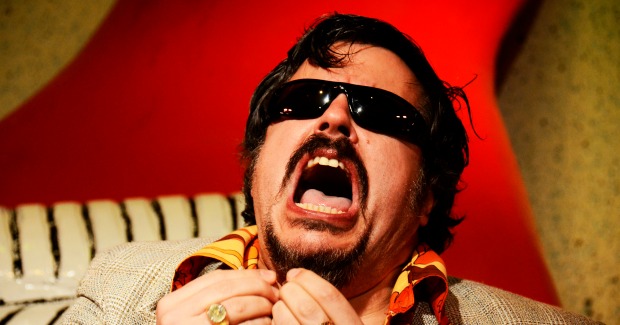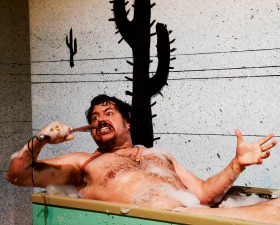You have no items in your cart. Want to get some nice things?
Go shopping
The American Dream has hovered on the horizon for the better half of two centuries—an illusory but irresistible preoccupation for writers from F. Scott Fitzgerald to David Foster Wallace. It is a fascination shared on this side of the Atlantic, and London recently played host to two distinct explorations of the dark places we can be led in our pursuit of happiness. As part of the Vault festival, Lou Stein reanimates his 1982 adaptation of Hunter S. Thompson’s seminal Fear and Loathing in Las Vegas, while across town at the Almeida, Rupert Goold directs ‘a new musical thriller’ version of Bret Easton Ellis’ controversial 1991 American Psycho.
Both Thompson and Easton Ellis are lauded for casting light on the hypocrisy and hopelessness of their generations. For Thompson it was the “high and wild” middle ‘60s in San Francisco and the broken wave of countercultural optimism. In American Psycho, Ellis lacerates the obsession with wealth, status and materialism that dominated the ‘80s. Novelists, like playwrights, have always been quick to diagnose the diseased spots of the nation—no more so than in the land of plenty. Americans, says Kurt Vonnegut in Cat’s Cradle, are always looking for love in places it doesn’t exist. “It must,” he writes, “have something to do with the vanished frontier.” In both productions, these vanished frontiers are embodied by the characters’ dissolving psyches. Frontiers don’t so much disappear as detonate as their respective leads Raoul Duke and Patrick Bateman blast off down every precarious path imaginable. Chemically engineered for depravity, they cross each and every boundary, merrily ripping off the glossy layers of the American Dream as they go.
Fleeting, intangible, unpredictable, restlessly alive. In many ways, theatre is the perfect medium to examine something so elusive. Stein’s production makes particularly good use of setting, cramming the audience into a low-ceilinged vault beneath Waterloo station where the actors stalk across the long, thin stage as tube carts rumble past like distant bomb blasts. Ed Hughes and John Chancer share narration duties, guiding us through the now infamous tale of Hunter S. Thompson’s drug and alcohol fuelled jaunt in Las Vegas. There are a few moments of dislocation as Hughes talks over Chancer in a way that doesn’t appear to be intentional. Overall, however, performances are as taut, dizzying and hard-hitting as a shot of mezcal.
When the themes are this dark, you’re going to need some dancing girls to hold the viewers’ attention, and both plays recognise that laughter is the only appropriate reaction to outright depravity. Neither production is short on entertainment value buoyed up by consistently strong performances. Matt Smith—weak in voice but strong in cheekbones—is a powerful vehicle for Bateman’s slippery, ivy-leagued machismo, popping pills, raping cuddly toys and swinging his axe with aplomb. The former Doctor Who possesses the perfect face for flickering psychosis; his knotted brow, opaque eyes and pitiless grin fix in a mask reminiscent of the Bacon-esque cover illustration on the novel’s paperback version.

In Fear and Loathing, Rob Crouch steals the show as Duke’s sidekick Dr. Gonzo. The play reaches its highest pitch during a bathtub scene where Gonzo instructs Duke to kill him by throwing a radio into his bath while Grace Slick wails through “White Rabbit.” His ensuing, naked, bubble-covered rage makes for a stirring if disturbing spectacle.
Consumption is a persistent theme here —Bateman’s absurdly haute cuisine, his fiancée’s Manolo Blahnik addiction, Duke and Gonzo’s “serious drug collection”—but it is Stein who plays most effectively on the double definition of the word consumption: in one sense, to use up a resource; in its more dated usage, a wasting disease that destroys the victim from the inside out. Scenes of hallucinogen-addled surrealism are made especially horrible by impressive physical theatre; the ensemble transform into writhing reptilians, nightmarish waitresses and a series of other Hogarthian grotesques. In American Psycho, Goold makes it all look like a bit too much fun.
Perhaps it is the quality of Thompson’s writing—and Lou Stein’s nuanced adaptation—that fosters a sense of menace that is absent in American Psycho. In Goold’s production, persistently dazzling little musical numbers sway precariously between satire and celebration. “You Are What You Wear” is joyful stomp down the catwalks of the era, and the synth-pumping “Hard Body” is more of a homage than a parody of the ‘80s fetish for everything ultra-fit. With sets from Kanye West’s stage designer Es Devlin and a cast of unfeasibly gorgeous actors, it plays a little too easily into the jaws of the purely aesthetic. For all its flaws, Easton Ellis’ novel works by contrasting dull surface detail with graphic violence (think crucified prostitutes, gouged eyes and a stomach churning rat scene). The novel’s gore has been justifiably toned down here, but its fixation on fashion, fast cars, fancy food and face creams ought to have been adjusted accordingly. Despite its delicious visuals—and there are plenty—the piece is riddled with the very problems it attempts to ridicule. Bateman’s late assertion that “there is no real me, only an entity, something illusory” also acts as a neat descriptor of the essential vacuity at the production’s heart. In a way, however, this vacuity is what makes it such an accurate embodiment of the American dream.
Fear and Loathing in Las Vegas runs until 8th March, 2014, as part of the Vault Festival.

About Maia Jenkins
Maia is a London based writer. She grew up in Singapore and France but moved back to the UK in 2009. She has just completed an MA in Modern Literature at University College London and is now working on a novel. She also holds a BA from King’s College London, where she was a founding member of the literary society journal ‘Of Cabbages and King’s’. While at university she received the Henry Neville Gladstone prize and the Sambrook Exhibition. In October 2013 she won the GQ Norman Mailer Student Writing Prize and will be published in a forthcoming issue of GQ.




